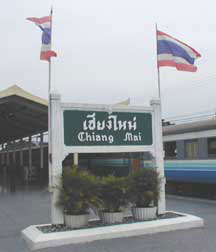
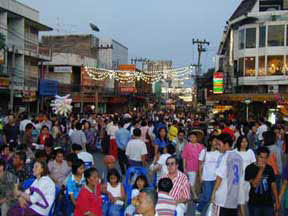
Sunday Market crowd
Welcome to Chiang Mai
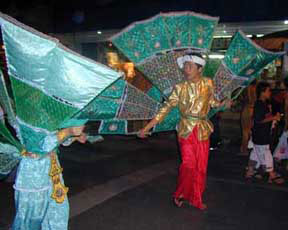
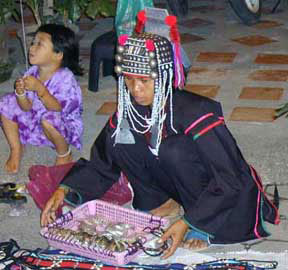
Sunday Market Dancers
Akha Hilltribe Woman
14 November 2002
This is a first look at Chiang Mai - flower of the north and our home for the months to come. Over the next weeks, we will share with you our thoughts
and impressions, happy experiences and frustrations. As we settle in,we hope to write not only bout events and special sights here, but also of our day to
day life and the lives of those we see around us. We hope to include some current events from Asia that you might not hear about in the U.S. and to
create an opportunity for students from the U.S and some from Thailand to have contact with each other.
The Sunday Evening Market
Besides the very touristy, daily night market, every Sunday evening
vendors gather at Pratdu Tha Phae (pronounced Brat-dough Tah-Pay), the eastern gate of the old city. The Tha Phae road is closed to traffic. Street
musicians play everything from drums, to guitars, to ancient Thai instruments. Students perform drum and dance rituals to raise money for their schools.
Akha hill tribe members sell native textiles and jewelry. Thai crafts people market hammered metal work, wood carvings, hand-woven textiles, ceramics.
Sweet pineapple and papaya is cut up, skewered and served in plastic bags. Tiny hot coconut pancakes cook on griddles along side vendors selling corn
-on-the cob and lean chicken grilled on sticks.
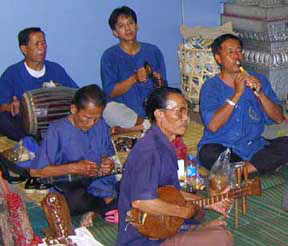
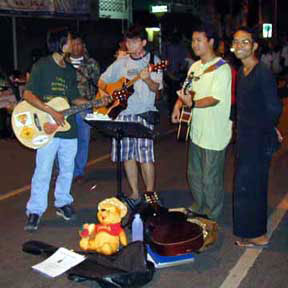
Street musicians - on classical instruments raising funds for the temple ....
... and Thai modern band
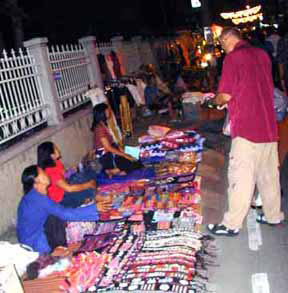
A "farang" (foreigner) shopping along Tha Phae road market
A Brief History of Chiang Mai*
Verifiable records indicate that the ancient city appears to have begun with
a number of early settlements along the Mae Nam Ping (Ping River) running along the eastern side of town. This area was ruled by the Burmese until a
prince from what is now called Chiang Saen over ran a Hmong settlement in 1296 and began developing the area. Another conqueror took over in 1281
and by 1296 had built the ancient city walls. Traces of these walls can still be seen today.
In the 14th and 15th centuries, Chiangmai was part of the larger Lanna
kingdom. During this time it became an important religious and cultural center and in 1477 hosted the 8th world synod of Theravada Buddhism. Trade
continued after 1556 when the Burmese once again captured the city and continued their rule for the next 200 years.
Ralph Fitch, a London trader, is the first know Westerner to visit Chiangmai. That was for several months in 1587. In 1613, Burmese troops captured a
second Englishman from the East India Company, then carried him off to Myanmar where he died.
King Taksin of Thailand (Siam) recaptured the city in 1775. It was his troops
that took three years to construct the giant brick walls around the inner city. Under Thai rule, Chiangmai became an important regional handcraft and trade
center. Pottery, weaving, umbrella making, silver and metal work, woodcarving were famous even before tourists knew of them.
A northern railway linking Chiangmai to Bangkok was completed in 1921, giving Siam and the world greater access to the city. Cummings writes:
In 1927 King Rama VII And Queen Rambaibani road into
the city at the head of an 84-elephant caravan, becoming the
first central Thai monarchs to visit the north, and in 1933
Chiang Mai officially became a province of Siam. (Lonely Planet, 2002)
* Information taken from Chiang Mai and Northern Thailand (Cummings, Joe,
Lonely Planet Publications Pty Ltd, Victoria, Australia, April 2002)
Current Events - 14 November 2545 (Buddhist Epoch)
BBC Asia news reports that North Vietnam will again allow boxing after a ban since the early 1990's. The government placed a ban on the sport believing that it is too violent. No explanation was given for the change.
The Bureau of Royal Rainmaking and Agricultural Aviation in the Ministry of Agricultural Cooperatives named 14 November 2002 as Father of the Royal
Rainmaking Day. His Majesty King Bhumibol Adulyadej pioneered the project in 1955 to development and research of new rainmaking techniques including, but not limited to, cloud seeding.
With typical Thai greetings, we hope you will be strong and happy.